For the first time since the early 20th century, the Lebanese people are talking about famine, writes As`ad AbuKhalil.
By As`ad AbuKhalil
Special to Consortium News
 Lebanon has been reverting to a state of disrepair and financial collapse that has not been seen since WWI and the famine that ensued, which resulted in the death of some 200,000 Lebanese.
Lebanon has been reverting to a state of disrepair and financial collapse that has not been seen since WWI and the famine that ensued, which resulted in the death of some 200,000 Lebanese.
For the first time since the early 20th century, the Lebanese people are talking about famine, and a website was started to help Lebanese engage in barter in order to feed their families.
Meat has become prohibitively expensive while the price of fish has gone down and yet it is not as abundantly available as it was only months ago. It is not a coincidence that Israeli threats against Lebanon — which are regular and consistently not covered in Western media (instead extensively covering up any utterance deemed harmful of Israel by any Arab anywhere in the world) — have not stopped since Israel’s humiliation in the July 2006 war.
Israeli threats always include pledges to inflict harm and destruction on Lebanon and to take it “80 years back in time,” or even to the Stone Age.
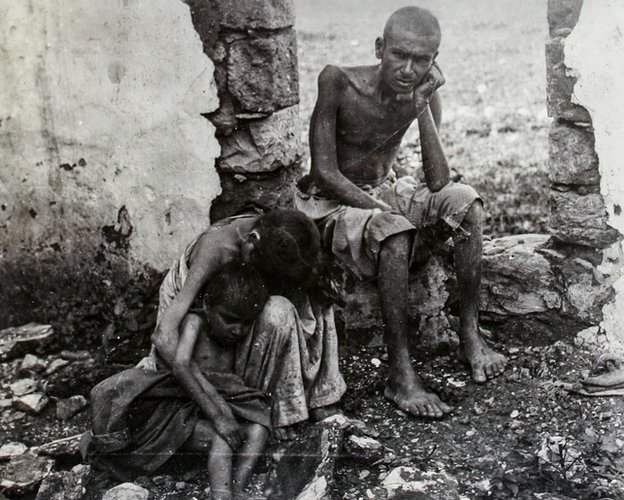
Starving man and child in Mount Lebanon, between 1915-1918. (Wikimedia Commons)
Yet, as Lebanon suffers one of its worst economic crisis in centuries, Western governments, media, and D.C. pundits have deliberately turned a blind eye to the suffering.
Had Jamal Khashoggi not been writing for The Washington Post at the time of his death, the D.C. elite and Western correspondents would not have discovered that the Saudi regime was sinister, repressive and had been consistently bombing civilians in Yemen.
Western media were upset over the killing of Khashoggi not so much because they were appalled by the crimes of a pro-U.S. regime, but because they felt that the murder of Khashoggi (who had long served Western journalists in a variety of ways) was offensive to them — at a personal level.
The scant coverage of the suffering in Lebanon is consistent with the way Western media and think tanks refer to Israel’s war on Lebanon in 2006 as the Israel-Hizbullah War, as if the civilians who were killed by Israeli bombs were terrorist civilians.
UN-affiliated organizations and Western human rights bodies have also failed to raise alarm about the plight of civilians in Lebanon. For those organizations, the suffering of natives only matters if it’s caused by non-client governments of the U.S. and Israel. The silence of Western media about the drastic deterioration of living conditions in Lebanon confirms the suspicion of many Arabs about Western media working in unison with Western governments and Israel.
US Ambassador Goes on Offensive
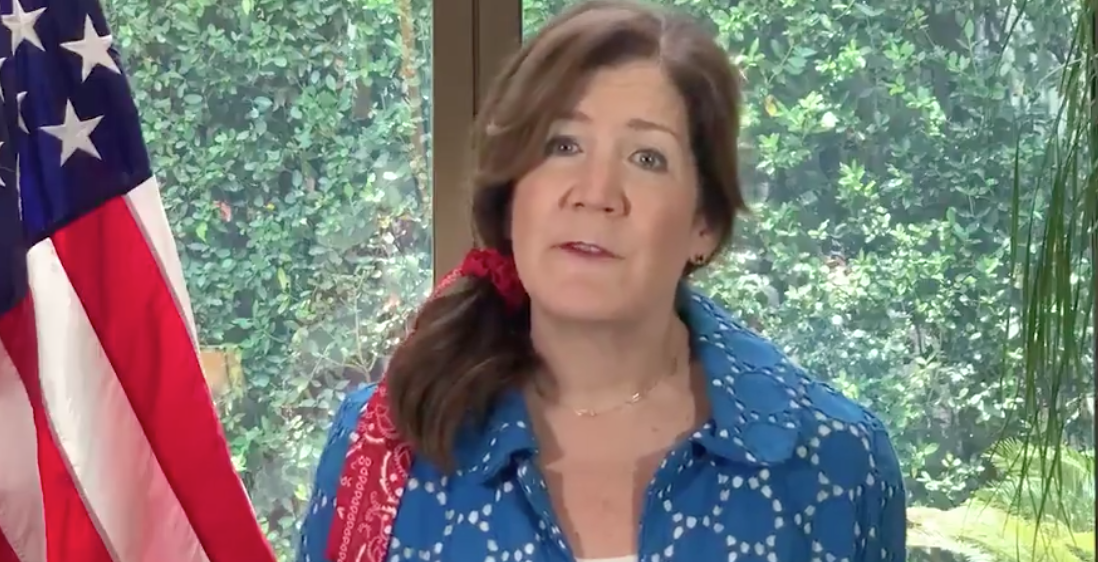
U.S. Ambassador Dorothy Shea delivering Independence Day message, July 4, 2020. (Twitter)
In the last two weeks, the new U.S. ambassador in Lebanon, Dorothy Shea, has been launching a propaganda offensive against Hizbullah that seems more aggressive and open than that of her predecessors.
It came in response to a speech by Hasan Nasrallah in which the Hizbullah leader accused the U.S. of putting pressures on Lebanon in order to disarm Hizbullah and serve Israeli interests. Nasrallah also reiterated his party’s call for “an Eastern orientation,” in reference to his desire to reach economic deals with countries in the east, from Iran and Iraq all the way to China.
He said that China is ready to help Lebanon (and the Chinese embassy followed with a statement indicating its willingness to work with Lebanon). After the speech, the U.S. ambassador quickly took to the Lebanese airwaves. She responded directly to Nasrallah and accused the party not only of terrorism but also of looting the Lebanese treasury.
Shea clearly benefited from the fact that most (if not all) Lebanese TV stations, and even internet sites, are funded by the Saudi regime (or its clients in Lebanon), or by the EU or the U.S. All those TV stations carried Shea’s propaganda without rebuttal or even basic journalistic interrogation.
Lebanese Broadcasting Corporation International, or LBCI, (founded by the right-wing, pro-Israeli war criminal, Bashir Gemayyel, during the war) has become a favorite outlet for U.S. propaganda, along with the right-wing racist, misogynist, MTV. LBCI also aired videos praising U.S. “donations” to Lebanon.
Differences of Opinion
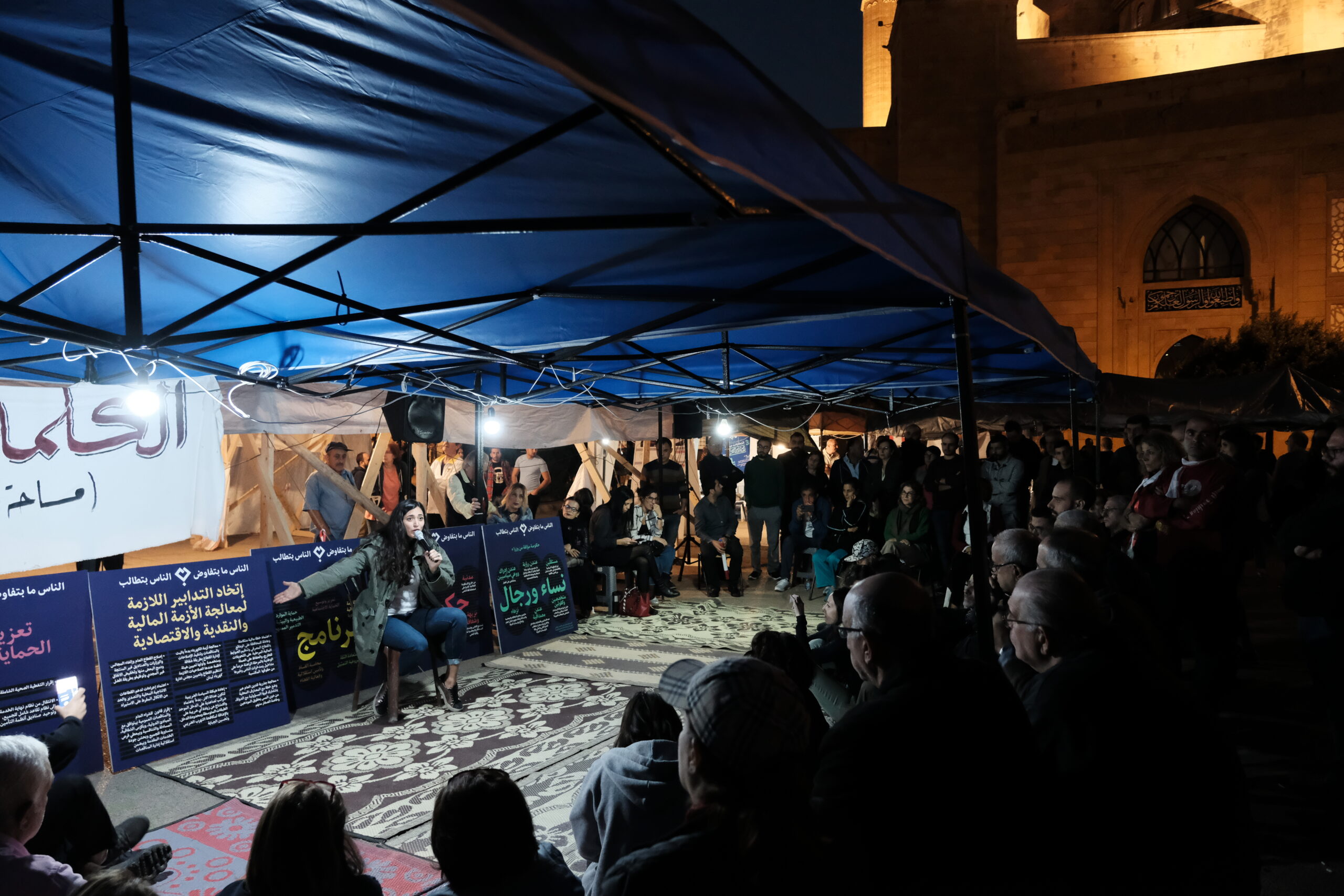
Debate tent in Beirut’s Martyr’s Square for discussing economic policy. (Nadim Kobeissi, CC BY-SA 4.0, Wikimedia Commons)
There are deep differences of opinion among the Lebanese over the causes of the Lebanese economic crisis. It would be an exaggeration to maintain that the U.S. is solely responsible. Clearly, the person most responsible is Rafiq Hariri, who was installed as prime minister by a U.S.-Saudi-Syrian understanding in 1992.
Hariri designed the plan for the economic recovery of Lebanon, which enriched himself along with his cronies immensely. He insisted on disregarding the development of the agricultural and industrial sectors. Lebanon can only rely on the service sector, he insisted.
Hariri blocked plans for fixing the electric power shortages, and providing a network for public transportation. He also installed Riyad Salameh as the governor of the central bank — and Salameh is now blamed for financial schemes that resulted in the devaluation of the Lebanese pound. (The U.S. has not made its support for Salameh a secret, giving his close working relationship with the U.S. Treasury).
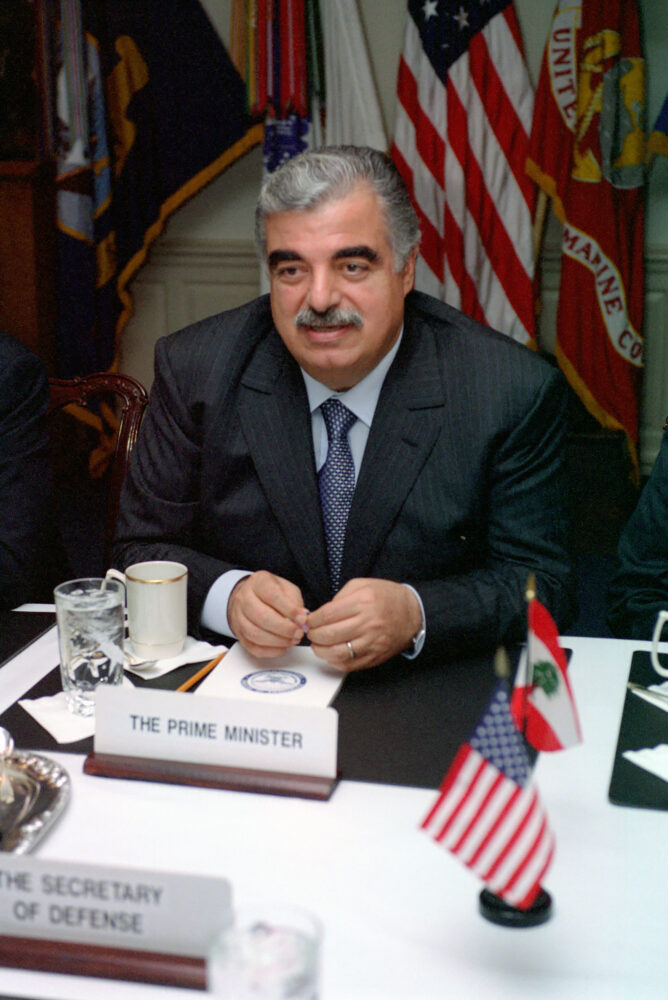
Prime Minister Rafiq Hariri of Lebanon attends a meeting at the Pentagon, Washington, D.C., April 25, 2001. (Helene C. Stikkel, Wikimedia Commons)
Rafiq Hariri and Salameh were close allies of the U.S. and of the Syrian regime during its years of domination in Lebanon.
Allies of Hizbullah, like the Amal Movement and later the Tayyar of president Michel Awn, also were in power and also benefited from the looting of the treasury.
Hizbullah was not represented in government before 2005 and its ministers were not known for corruption. However, the entire political system was corrupt and Hizbullah did little to address that or to fix it.
Hizbullah focused on maintaining its arms and allowed others to manage the Lebanese’s economy.
Even during this crisis, Hizbullah has been in full support of the corrupt system, and failed to propose any radical economic measures. (Contrary to misconceptions among Western leftists, Hizbullah does not adhere to a socialist ideology).
Hizbullah considers its alliance with Nabih Berri (speaker of parliament and leader of Amal) as sacrosanct. Berri is not only one of the key corrupt leaders but has been central in blocking any economic reforms that penalize the upper class and banks in recent months.
But the U.S. will have a hard time convincing Lebanese that Nasrallah’s corruption (and even his enemies don’t accuse him personally of corruption) is in the same league as that of either Rafiq Hariri or his son Saad; or that of Walid Jumblat, Najib Miqati, Butrus Harb, Amin Gemayyel, Fu’ad Sanyurah and many others in the ruling class. Even Berri enjoys good relations with the U.S.
Washington will prevent any accountability or forensic financial investigation that would expose or punish its clients in Lebanon.
But Hizbullah, by its sectarian alliances and its opposition to protests since October 2019, can’t have it both ways. It can’t on the one hand claim that it opposes corruption and yet maintain solid alliances with corrupt elements of the political class. Nor can it act as a shield for the ruling regime against popular protests — even if those protests have been infiltrated by elements loyal to the Saudi regime and others.
Nasrallah Triggers US Propaganda Blitz
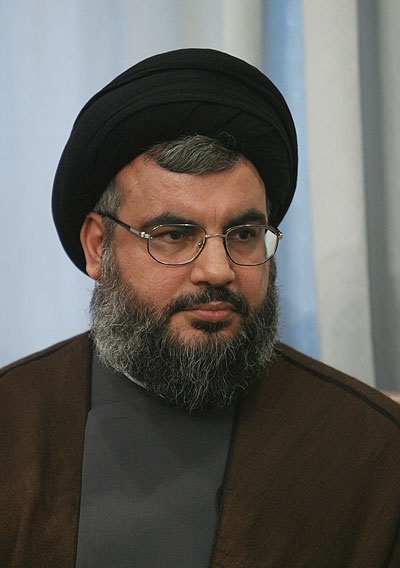
Hassan Nasrallah in 2005. (Fars News Agency, CC BY 4.0, Wikimedia Commons)
The propaganda blitz of the U.S. ambassador in Lebanon caused quite a stir last week.
Muhammad Mazih, a local judge in the city of Tyre, issued a ruling in which he banned Lebanese media from airing interviews with the U.S. ambassador, who he accused of fomenting civil strife in the country.
Others pointed out that her statements interfere in internal Lebanese affairs, which is contrary to her diplomatic mission, and to the Vienna treaty governing diplomatic relations of countries.
Supporters of U.S.- Saudi regime were up in arms, accusing the judge of overreach. He was pressured to tender his resignation and his ruling was, naturally, left unimplemented.
Salim Juraysati, senior adviser to the Lebanese president, offered an apology to the U.S. ambassador following the judge’s ruling. When I asked Juraysati over WhatsApp why he apologized, he said he merely apologized for the “controversy” (“laghat”) which ensued after the TV interviews of the U.S. ambassador.
I asked the adviser why an apology would be necessary for a case in which Lebanese of various opinions were simply exercising their right to freedom of speech, but I did not get any persuasive answer.
The U.S. embassy seems to have also been displeased with the China option. The ambassador went to great lengths to criticize the Chinese government’s relations with developing countries and to — impudently—bring up the issue of the plight of Muslims in China, as if Western governments are known for their kind embrace of Muslims and their rejection of Islamophobia.
The U.S. and Saudi regimes are not willing to help Lebanon, and hope that the economic squeeze will pressure the Lebanese people to blame Hizbullah for their misfortunes. But the U.S. and Saudi regimes are going further by preventing any government from assisting Lebanon during its crisis.
All Arab governments have ignored Lebanese suffering, as have Western governments. The IMF is now engaged in negotiations with the Lebanese government and it is most unlikely that the U.S. will allow it to offer any substantial amount of dollars. Meanwhile, corrupt Lebanese leaders (both allies and opponents of Hizbullah) are not willing to offer minimum levels of reforms.
You look around the world: from Venezuela to Iran, along with Syria and Lebanon, and you see the impact of cruel U.S. sanctions. The U.S. (since at least the Bush and Clinton administrations in the 1990s) has decided to use the advances in technology and the end of the Cold War to impose draconian punishment on civilian populations in the hope that they would push out governments that the U.S. and Israel don’t like.
But if the Lebanese population continues to suffer, none of the big powers in Lebanon will be spared, and corrupt U.S. clients will be objects of popular wrath.
As’ad AbuKhalil is a Lebanese-American professor of political science at California State University, Stanislaus. He is the author of the “Historical Dictionary of Lebanon” (1998), “Bin Laden, Islam and America’s New War on Terrorism (2002), and “The Battle for Saudi Arabia” (2004). He tweets as @asadabukhalil
The views expressed are solely those of the author and may or may not reflect those of Consortium News.
Please Contribute to Consortium
News on its 25th Anniversary
Donate securely with  PayPal here.
PayPal here.
Or securely by credit card or check by clicking the red button:

Thank you again Prof. Abu-Khalil for this – once again – deeply depressing, truthful account of realities in Lebanon specifically and the ME more generally (in fact).
The reality is that the US (and OAP i.e. Israel) don’t give a damn about the corruption of Lebanon’s political elites and their parties – the more corrupt the better from their point of view because the more willing to go along with whatever the US-OAP want. And Hizbullah is the stone in the shoe. It is a formidable military force – a necessary one otherwise Lebanon would be another annexed country and the Palestinian refugees there forced out when not slaughtered. And it is this aspect of Hizbullah that, as you are only too aware, really sticks in the craws of both the US and OAP. They know full well that the Lebanese army are useless (why is a mystery to me) and have been for decades. Hizbullah is another story.
So they have to go. They must be classified as “terrorists” (laughable coming from the US and OAP, were it not so bloody awfully hypocritical of both) and thus delegitimized – despite their having saved Lebanon from being overrun by the IDF (the OAP’s military). Well – that’s the reason, of course. NO other people, country, society in the region can prove to be better, stronger militarily, can defeat OAP.
Then there’s Saudia. On the face of it one would think that they’d stand by another Middle Eastern largely Muslim nation. But the Saudis are Wahhabis, off-with-their-heads types, and aren’t some of the Lebanese elites Muslim Brotherhood? Anyway definitely not Wahhabbist.
Starving ordinary people to death by the tens of thousands – deliberately, knowingly: isn’t that a crime against humanity? Isn’t it immoral, unethical, inhumane, barbarous? But apparently neither the lives of ordinary working Lebanese nor those of the Yemenis (nor over the pond of the Venezuelans) count when the US (and OAP) and other western nations want their interests to be first, foremost. Obscene doesn’t cover it.
Thank you again Prof. Abu-Khalil for this – once again – deeply depressing, truthful account of realities in Lebanon specifically and the ME more generally (in fact).
The reality is that the US (and OAP i.e. Israel) don’t give a damn about the corruption of Lebanon’s political elites and their parties – the more corrupt the better from their point of view because the more willing to go along with whatever the US-OAP want. And Hizbullah is the stone in the shoe. It is a formidable military force – a necessary one otherwise Lebanon would be another annexed country and the Palestinian refugees there forced out when not slaughtered. And it is this aspect of Hizbullah that, as you are only too aware, really sticks in the craws of both the US and OAP. They know full well that the Lebanese army are useless (why is a mystery to me) and have been for decades. Hizbullah is another story.
So they have to go. They must be classified as “terrorists” (laughable coming from the US and OAP, were it not so bloody awfully hypocritical of both) and thus delegitimized – despite their having saved Lebanon from being overrun by the IDF (the OAP’s military). Well – that’s the reason, of course. NO other people, country, society in the region can prove to be better, stronger militarily, can defeat OAP.
Then there’s Saudia. On the face of it one would think that they’d stand by another Middle Eastern largely Muslim nation. But the Saudis are Wahhabis, off-with-their-heads types, and aren’t some of the Lebanese elites Muslim Brotherhood? Anyway definitely not Wahhabbist.
Starving ordinary people to death by the tens of thousands – deliberately, knowingly: isn’t that a crime against humanity? Isn’t it immoral, unethical, inhumane, barbarous? But apparently neither the lives of ordinary working Lebanese nor those of the Yemenis (nor over the pond of the Venezuelans) count when the US (and OAP) and other western nations want their interests to be first, foremost. Obscene doesn’t cover it.
Thanks
What it is been done in Lebanon is been developed in Brazil with the power given to Bolsonaro.
Pepe Escobar has a good grasp of the situation, as well as the economic side can be explained by Dr. Michael Hudson
SEE: youtube.com/watch?v=nluLNA30e8k (Dr. Michael Hudson on economics)
and
SEE: michael-hudson.com/2020/05/undermining-public-finance-to-drive-privatization/
Book:
and forgive them their debt
Will give the people of Lebanon an idea of what is going on and how to change the narrative and the actions.
Thank you for this. What a catastrophe. I am constantly reading about the end of the US empire, in writings that bot welcome and mourn it. I sure don’t see any sign of it. The behavior of the US state could be a signal of desperation, as some insist. It could also be a sign of simply not caring any more about its “standing”, or “soft power.” No other government in the world besides the ones the US wants “regime change” of even peeps about these outraged, and the UN and all of its affiliates are US occupied territory. Anybody have any informed guesses as to when this empire is finally going to end? Asking for a friend…